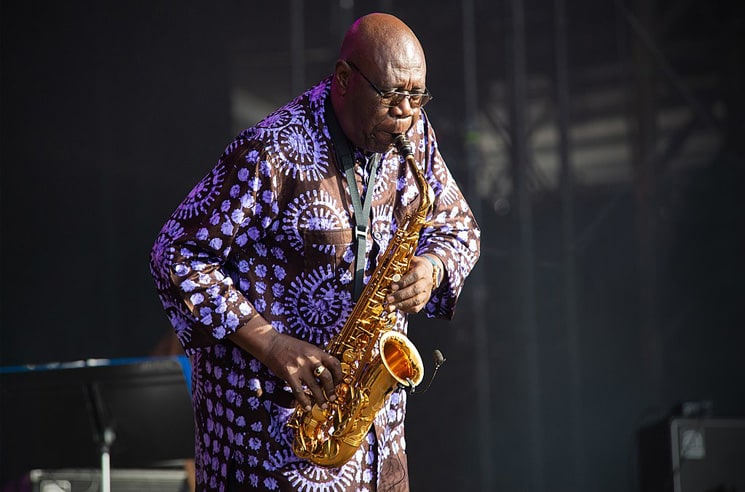Manu Dibango — a Cameroonian musician and songwriter revered for his fusion of jazz, funk and traditional Cameroonian music — has died of coronavirus. Dibango's passing today was confirmed in a statement shared through his Facebook page. He was 86.
"It is with deep sadness that we announce you the loss of Manu Dibango, our Papy Groove, who passed away on 24th of March 2020, at 86 years old, further to COVID-19," the statement reads. "His funeral service will be held in strict privacy, and a tribute to his memory will be organized when possible."
Born in Douala, Cameroon, in 1933, Dibango began learning instruments, including mandolin, saxophone and piano while attending high school in France. His time in the country also led to his first encounters with jazz music, through classmates and radio.
"The blacks that we saw [in France] were either boxers like Sugar Ray Robinson — or jazzmen," Dibango recalled in a 2018 interview. "There wasn't any African music at all, since there were no African workers, and no artists. Only us with our limited folk memories, nothing at all. So, we ended up going down to the cellars in Paris, where we could see the [Louie Armstrongs] and the Count Basies with whom we identified. They were the only ones and they were at the top."
A move to Brussels led Dibango to meet bandleader Joseph Kabasele, who recruited the saxophonist to tour Europe with his rumba group African Jazz. He also spent time in Congo and Cameroon before returning to Paris in 1965.
Dibango would make his solo debut with a self-titled album in 1968. In 1972, he released single "Soul Makossa," which would go on to become an international hit. Initially penned as a B-side for Cameroon national football anthem "Hymne de la 8e Coupe d'Afrique des Nations," the song's refrain would soon become immortalized in pop culture history thanks to Michael Jackson.
On Thriller opener "Wanna Be Startin' Somethin'," Jackson famously interpolates "Soul Makossa" chorus lyrics "mama-say, mama-sa, ma-makossa" — an inclusion he made without properly crediting Dibango.
Rihanna then sampled the lyric for her 2007 single "Don't Stop the Music," which earned Jackson a writing credit. Dibango sued both pop stars in February of 2009, claiming both songs used the phrase without proper permission.
Prior to the suit, it was reported that Jackson had admitted to using the line and had settled with Dibango out of court. However, it was alleged that the King of Pop had approved Rihanna's 2007 request without contacting Dibango. A judge then ruled Dibango's claim inadmissible.
Dibango's work has also been sampled by the likes of the Chemical Brothers, Busta Rhymes, Will Smith, 9th Wonder and the Jungle Brothers. Collaborations across his career include work with Fela Kuti, Herbie Hancock, Bill Laswell, Bernie Worrell, Ladysmith Black Mambazo, King Sunny Adé, Don Cherry, and Sly and Robbie.
"It is with deep sadness that we announce you the loss of Manu Dibango, our Papy Groove, who passed away on 24th of March 2020, at 86 years old, further to COVID-19," the statement reads. "His funeral service will be held in strict privacy, and a tribute to his memory will be organized when possible."
Born in Douala, Cameroon, in 1933, Dibango began learning instruments, including mandolin, saxophone and piano while attending high school in France. His time in the country also led to his first encounters with jazz music, through classmates and radio.
"The blacks that we saw [in France] were either boxers like Sugar Ray Robinson — or jazzmen," Dibango recalled in a 2018 interview. "There wasn't any African music at all, since there were no African workers, and no artists. Only us with our limited folk memories, nothing at all. So, we ended up going down to the cellars in Paris, where we could see the [Louie Armstrongs] and the Count Basies with whom we identified. They were the only ones and they were at the top."
A move to Brussels led Dibango to meet bandleader Joseph Kabasele, who recruited the saxophonist to tour Europe with his rumba group African Jazz. He also spent time in Congo and Cameroon before returning to Paris in 1965.
Dibango would make his solo debut with a self-titled album in 1968. In 1972, he released single "Soul Makossa," which would go on to become an international hit. Initially penned as a B-side for Cameroon national football anthem "Hymne de la 8e Coupe d'Afrique des Nations," the song's refrain would soon become immortalized in pop culture history thanks to Michael Jackson.
On Thriller opener "Wanna Be Startin' Somethin'," Jackson famously interpolates "Soul Makossa" chorus lyrics "mama-say, mama-sa, ma-makossa" — an inclusion he made without properly crediting Dibango.
Rihanna then sampled the lyric for her 2007 single "Don't Stop the Music," which earned Jackson a writing credit. Dibango sued both pop stars in February of 2009, claiming both songs used the phrase without proper permission.
Prior to the suit, it was reported that Jackson had admitted to using the line and had settled with Dibango out of court. However, it was alleged that the King of Pop had approved Rihanna's 2007 request without contacting Dibango. A judge then ruled Dibango's claim inadmissible.
Dibango's work has also been sampled by the likes of the Chemical Brothers, Busta Rhymes, Will Smith, 9th Wonder and the Jungle Brothers. Collaborations across his career include work with Fela Kuti, Herbie Hancock, Bill Laswell, Bernie Worrell, Ladysmith Black Mambazo, King Sunny Adé, Don Cherry, and Sly and Robbie.




